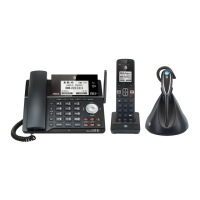165
Appendix
My calls cut in and out while I’m using my cordless handset.
X Other electronic products such as HAM radios and other DECT phones, can
cause interference with your cordless phone. Try installing your phone as
far away as possible from these types of electronic devices.
X Do not install this phone near a microwave oven or on the same electrical
outlet. You may experience decreased performance while the microwave
oven is operating.
X If you plug your phone in with a modem or surge protector, plug the
phone (or modem/surge protector) into a dierent location. If this does
not solve the problem, relocate your phone or modem farther apart from
one another, or use a dierent surge protector.
X Move your telephone base to a higher location. The phone may have better
reception when installed in a high area.
X If other phones in your home are having the same problem, contact your
telephone service provider (charges may apply).
The charge light is o.
X Make sure you plug the power and line cords in correctly and securely.
X Unplug the electrical power from the charger. Wait for 15 seconds, and
then plug it back in. Allow up to one minute for the cordless handset and
telephone base to reset.
X Clean the charging contacts on the cordless handset and charger each
month with a pencil eraser or cloth.
X A blinking CHARGE light is an indication that the battery is not connected
to the handset or is missing completely. Ensure that the battery is
installed properly.
My caller ID isn’t working.
X Caller ID is a subscription service. You must subscribe to this service from
your telephone service provider for this feature to work on your phone.
X The caller may not be calling from an area that supports caller ID.
X Both your and your caller’s telephone service providers must use caller ID
compatible equipment.
X If you subscribe to high-speed Internet service (DSL - digital subscriber
line) through your telephone line, you must install a DSL lter between the
telephone line cord and the telephone wall jack (pages 11-12). The
lter prevents noise and caller ID problems resulting from DSL interference.
Please contact your DSL service provider for more information about DSL
lters.
Troubleshooting

